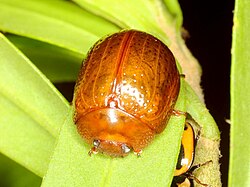| Dicranosterna | |
|---|---|
 | |
| Dicranosterna immaculata | |
| Scientific classification | |
| Kingdom: | |
| Phylum: | |
| Class: | |
| Order: | |
| Family: | |
| Subfamily: | |
| Genus: | Dicranosterna Motschulsky, 1860 |
| Species | |
See text for complete list | |
Dicranosterna is a genus of leaf beetles, in the subfamily Chrysomelinae.
Contents
These beetles are hemispherical and the larvae are globular (spherical). [1] The elytra have coarse punctures which are non striate (non aligned).
There are 36 species [2] and they occur throughout Australia. [3]
Dicranosterna is endemic to Australia. Host-plant is Acacia The record for Eucalyptus (Jolivet and Hawkeswood 1995) is erroneous (Reid 2002c). Larvae are globular, with inconspicuous setae and a pair of dorsal glands, and lack apicoventral (rear) pseudopoda (prolegs). [4]


